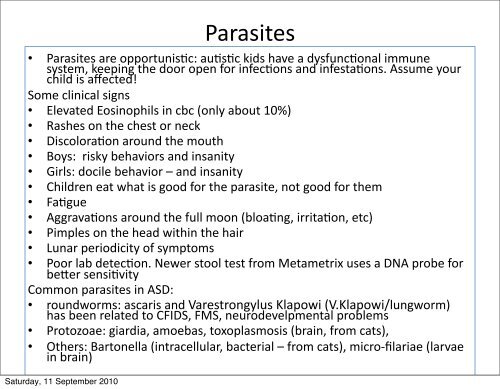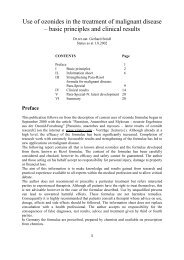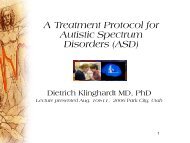Foundational Protocol for Autism and Chronic Illness - Klinghardt ...
Foundational Protocol for Autism and Chronic Illness - Klinghardt ...
Foundational Protocol for Autism and Chronic Illness - Klinghardt ...
You also want an ePaper? Increase the reach of your titles
YUMPU automatically turns print PDFs into web optimized ePapers that Google loves.
Parasites<br />
• Parasites are opportunis'c: au's'c kids have a dysfunc'onal immune<br />
system, keeping the door open <strong>for</strong> infec'ons <strong>and</strong> infesta'ons. Assume your<br />
child is affected!<br />
Some clinical signs<br />
• Elevated Eosinophils in cbc (only about 10%)<br />
• Rashes on the chest or neck<br />
• Discolora'on around the mouth<br />
• Boys: risky behaviors <strong>and</strong> insanity<br />
• Girls: docile behavior – <strong>and</strong> insanity<br />
• Children eat what is good <strong>for</strong> the parasite, not good <strong>for</strong> them<br />
• Fa'gue<br />
• Aggrava'ons around the full moon (bloa'ng, irrita'on, etc)<br />
• Pimples on the head within the hair<br />
• Lunar periodicity of symptoms<br />
• Poor lab detec'on. Newer stool test from Metametrix uses a DNA probe <strong>for</strong><br />
beFer sensi'vity<br />
Common parasites in ASD:<br />
• roundworms: ascaris <strong>and</strong> Varestrongylus Klapowi (V.Klapowi/lungworm)<br />
has been related to CFIDS, FMS, neurodevelpmental problems<br />
• Protozoae: giardia, amoebas, toxoplasmosis (brain, from cats),<br />
• Others: Bartonella (intracellular, bacterial – from cats), micro-‐filariae (larvae<br />
in brain)<br />
Saturday, 11 September 2010








